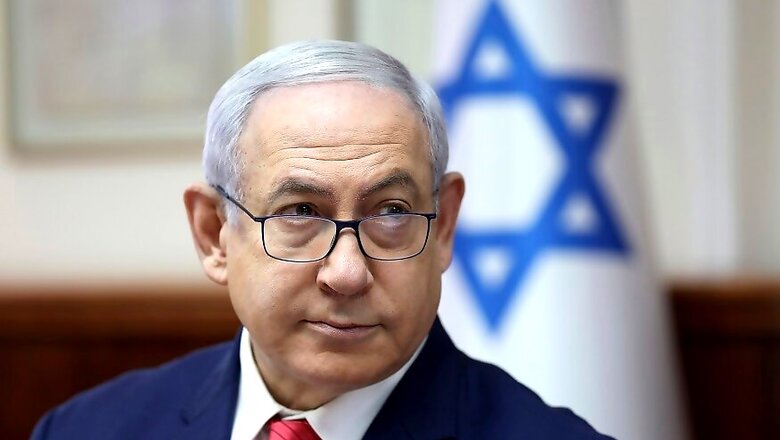
views
Gaza City: On Tuesday Israeli Prime Minister Benjamin Netanyahu announced he would annex the Jordan Valley in the occupied West Bank if he won upcoming elections. The pledge, a week ahead of a closely fought general election, was controversial but what would it actually mean?
What did Netanyahu say?
In a televised address Tuesday evening, Netanyahu announced he planned to annex the Jordan Valley as soon as victory was secured and his new government took office. "There is one place where we can apply Israeli sovereignty immediately after the elections," Netanyahu said, using a map of the Jordan Valley to illustrate his plans.
"If I receive from you, citizens of Israel, a clear mandate to do so ... today I announce my intention to apply with the formation of the next government Israeli sovereignty over the Jordan Valley and northern Dead Sea."
He specified that the plan would not include Palestinian cities, such as the Jordan Valley's Jericho, though it would effectively be encircled.
Hasn't he said that before?
Kind of. Israel is facing its second election in five months after Netanyahu along with his right-wing and religious allies emerged from polls in April with a majority, but he was unable to form a governing coalition.
Before those elections, he pledged to apply Israeli sovereignty, or annex, Israeli settlements in the West Bank, but without giving a timeframe or details. Tuesday's announcement was the first specific step to implement that decision, which he also re-committed to.
What is the Jordan Valley?
The Jordan Valley accounts for around one-third of the West Bank, located along the eastern side of the territory along the Jordanian border. It is almost all in Area C, the roughly 60 percent of the West Bank Israel fully controls.
It is home to only 9,000 or so of the more than 400,000 Israelis living in West Bank settlements, according to Israeli statistics, but is strategically important and hosts many Israeli businesses, largely agricultural.
Some 65,000 Palestinians live in the Jordan Valley, according to Israeli human rights group B'Tselem. Israeli right-wing politicians have long viewed the area as a part of the territory they would never retreat from, seeing it as the country's eastern border.
Palestinians believe that Israeli control so deep into the West Bank effectively ends the possibility of an independent Palestinian state. They say it amounts to an apartheid-like arrangement for Palestinian communities there.
What was the reaction?
The Palestinians were furious, saying the move would end faint prospects for a peace deal. "He is not only destroying the two-state solution, he is destroying all chances of peace," senior official Hanan Ashrawi told AFP.
A more important reaction from Netanyahu's perspective will be US President Donald Trump, whose strong support has been a major boost to Netanyahu. Trump, who had not yet commented, is due to announce a long-delayed peace proposal after the Israeli election.
The European Union warned that if carried out Netanyahu's pledge would "undermine the viability of the two-state solution and the prospects for a lasting peace."
Will it happen?
Ofer Zalzberg, senior analyst with the International Crisis Group, said the announcement was Netanyahu's attempt to increase right-wing support at next week's election. Polls in recent days have indicated he may again find it difficult to form a governing coalition, even if his Likud party is the largest.
Zalzberg said it was far from certain Netanyahu would win or that his coalition partners would all back such a plan.
What would it mean?
If imposed, the most immediate implications for Palestinians may be more symbolic than practical, Zalzberg said. Israel already controls the area, but formally annexing such a large part of the West Bank would be a clear indication the Jewish state never intends to give it up.
"It could lead to a dramatic decrease in Palestinian support for the two-state solution and lead Palestinian decision-makers to dramatic steps," he said. Palestinian president Mahmud Abbas said in a statement late Tuesday that if Netanyahu followed through with the threat, all peace agreements between them would no longer be valid.
Ashrawi said it was part of wider Israeli attempts to slowly force Palestinians out of the West Bank. "He (Netanyahu) is trying to take the land without the people and saying you are free to leave."
For Israeli settlers living or working in the Jordan Valley, annexation would mean developments in the area would no longer be decided on by the army but the regular Israeli ministries, potentially making getting permits easier.
But Zalzberg said that for Palestinians, the most important thing would be the indication that the current, supposedly temporary, situation would be considered permanent.


















Comments
0 comment